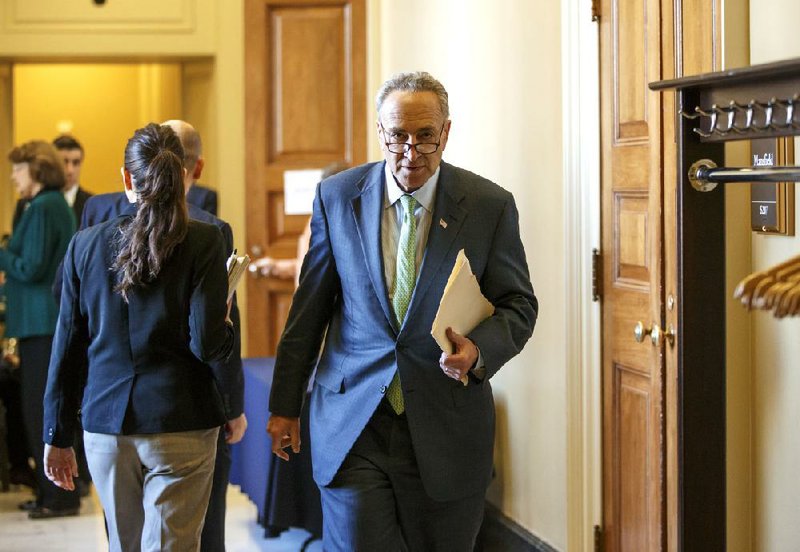WASHINGTON -- Democrats made a mistake by passing President Barack Obama's health care law in 2010 instead of first focusing more directly on helping the middle class, third-ranking U.S. Senate Democrat Charles Schumer said Tuesday.
"Unfortunately, Democrats blew the opportunity the American people gave them" in electing Obama and a Democratic Congress in 2008 in the middle of a recession, Schumer of New York said in a speech in Washington. "We took their mandate and put all our focus on the wrong problem -- health care reform."
Schumer said Democrats should have addressed issues that aided the middle class to build confidence among voters before turning to revamping the health care system. He said he opposed the timing of the health care vote and was overruled by other party members.
"The plight of uninsured Americans and the hardships created by unfair insurance company practices certainly needed to be addressed," the senator said. "But it wasn't the change we were hired to make" in the 2008 election.
Schumer's comments represent an unusual public intraparty criticism of the way Obama's signature legislative achievement was enacted. The senator spoke at the National Press Club to analyze the results of this month's election, when Republicans took control of the Senate and increased their majority in the House of Representatives.
Asked about Schumer's comments, White House spokesman Eric Schultz said, "I saw that he talked about the need to have an emphasis on the middle class, and that is something that drives us and this president every single day."
Much of Schumer's speech amounted to a critique of the Obama administration's handing of foreign and domestic policy matters before this month's election.
"As 2014 began, the parties were in stalemate," he said. "But, when government failed to deliver on a string of non-economic issues -- the rollout of the Obamacare exchanges, the mishandling of the surge in border crossers, ineptitude at the VA and the government's initial handling of the Ebola threat -- people lost faith in the government's ability to work and then blamed the incumbent governing party, the Democrats, creating a Republican wave."
A 16-day partial government shutdown in October 2013, which caused Republicans' approval ratings to plummet, created an opportunity for Democrats that was quickly eclipsed by the "disastrous" rollout of the health law's insurance exchanges, Schumer said.
The federal website for the insurance exchanges suffered from technical flaws that made it tough to use for more than a month in 2013.
"The rollout was a glaring example of government's ineffectiveness and became the perfect anecdote for the Republican's anti-government argument," he said.
To win back congressional majorities and keep the White House in 2016, "Democrats must embrace government, not run away from it," said Schumer, who led the Democratic Senatorial Campaign Committee in 2006 and 2008, when Democrats captured and then expanded their Senate majority.
Schumer stressed the importance of uniting the moderate and liberal wings of the party behind a common policy strategy that emphasizes the middle class.
"We must have our presidential candidate, or candidates, on same page," he said. "This is our most important mission during the year of 2015."
Former Secretary of State Hillary Rodham Clinton, also a former fellow New York senator, would be "a great candidate" for president, Schumer said.
"I hope she runs," he added. "She's just right for the times."
Voter discontent will continue until one of the political parties convinces middle-class Americans that it has an agenda for helping them, he said.
Democrats' pro-government posture "has the natural high political ground" when the middle class is frustrated, as voters were before this month's congressional election, Schumer said. At the same time, he said, Republicans were encouraging distrust toward government.
"That doesn't mean we always win," he said. "When we don't present a coherent, believable pro-government plan and message -- when we allow government to mess up -- we can easily lose."
Democrats, who spent much of the past year holding symbolic votes on policy initiatives they knew would fail, need to focus on policies that are "more than just messaging bills," said Schumer, a chief architect of Democrats' policy and communications approach before this year's election.
Republicans won eight Democratic-held Senate seats and could raise that total to nine if Rep. Bill Cassidy defeats incumbent Louisiana Sen. Mary Landrieu in a Dec. 6 runoff. Landrieu, who is seeking a fourth term, has trailed in polls.
After the losses, Schumer and the rest of the Democratic leadership team were re-elected to their posts Nov. 13. A handful of moderate Democrats opposed keeping Harry Reid of Nevada as Democratic leader.
Information for this article was contributed by Roger Runningen of Bloomberg News.
A Section on 11/26/2014
